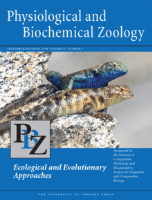
PHYSIOLOGICAL AND BIOCHEMICAL ZOOLOGY
metrics 2024
Unraveling the Complexities of Zoological Sciences
Introduction
Physiological and Biochemical Zoology is a distinguished peer-reviewed journal published by University of Chicago Press, focusing on the interrelated fields of animal physiology, biochemistry, and zoology. With a strong commitment to advancing scientific understanding, this journal serves as a vital resource for researchers, professionals, and students alike, providing a platform for the latest findings and advancements in the field. Ranking in the top quartile (Q1) in Animal Science and Zoology as of 2023, and showcasing a substantial convergence of historical data from 1999 to 2023, its impact in the academic community is underscored by its engagement with high-quality research. While it also appears in the third quartile for Biochemistry and Physiology, the journal successfully integrates these disciplines, reflecting the complexity of biological systems. Available for reading via various access options, this journal is essential for anyone seeking to deepen their knowledge or contribute to the field of Zoological sciences.
Metrics 2024
 0.60
0.60 1.80
1.80 1.90
1.90 96
96Metrics History
Rank 2024
Scopus
IF (Web Of Science)
JCI (Web Of Science)
Quartile History
Similar Journals

JOURNAL OF EVOLUTIONARY BIOCHEMISTRY AND PHYSIOLOGY
Bridging Evolutionary Theory and Biochemical InnovationJOURNAL OF EVOLUTIONARY BIOCHEMISTRY AND PHYSIOLOGY, published by PLEIADES PUBLISHING INC, is a pivotal periodical that delves into the intricate relationships between biochemical processes and evolutionary dynamics. With its ISSN 0022-0930 and E-ISSN 1608-3202, this journal serves as a comprehensive platform for researchers, professionals, and students dedicated to understanding the physiological adaptations and biochemical mechanisms influenced by evolutionary pressures. Although it is not an open access journal, it offers valuable insights across its historically significant coverage spanning from 1972 to 2017, making it an essential resource for those working in agricultural, biological, and molecular sciences. Despite its current Scopus rankings revealing limited visibility within its fields, the journal remains committed to fostering scholarly dialogue and advancing knowledge in the realm of evolutionary biochemistry, especially for those exploring the ecological, genetic, and integrative physiological aspects of life.
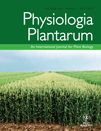
PHYSIOLOGIA PLANTARUM
Charting New Territories in Plant Research and GeneticsPHYSIOLOGIA PLANTARUM, published by WILEY, is a prestigious journal in the fields of plant science, physiology, and genetics, known for its impactful contributions since its inception in 1948. With an impressive impact factor and a consistent ranking in the Q1 and Q2 quartiles, it stands out in critical disciplines such as cell biology and biochemistry, ranking #24 in Plant Science with a remarkable 95th percentile standing. This journal primarily serves researchers and professionals committed to advancing the understanding of plant functions, responses, and their molecular mechanisms. Its broad scope allows for a diverse array of studies, ensuring that groundbreaking research is accessible to the global scientific community. Although it does not offer Open Access, PHYSIOLOGIA PLANTARUM remains a vital resource for scholars looking to stay at the forefront of plant biology and related fields.

Frontiers in Physiology
Elevating the standards of physiological scholarship.Frontiers in Physiology, published by FRONTIERS MEDIA SA, is a leading open-access journal that has been at the forefront of physiological research since its inception in 2010. As a reputable publication based in Switzerland, it aims to foster the dissemination of groundbreaking findings across various domains of physiology, engaging a global audience of scholars and practitioners. With a commendable Q2 ranking in the fields of both general physiology and medical physiology for 2023, this journal stands out in its field, achieving a significant Scopus rank of #32/113 in medical physiology and #58/193 in biochemistry, genetics, and molecular biology. Frontiers in Physiology not only commits to maintaining high scholarly standards but also ensures that all its articles are freely accessible, thereby promoting collaborative knowledge exchange. With a clear focus on advancing our understanding of physiological processes, the journal plays a crucial role in the development of innovative approaches to health and disease, making it an essential resource for researchers, professionals, and students alike.

FISH PHYSIOLOGY AND BIOCHEMISTRY
Innovative Insights into Fish BiochemistryFISH PHYSIOLOGY AND BIOCHEMISTRY, published by Springer, is a leading journal in the fields of aquatic science, biochemistry, and physiology, with an impressive trajectory since its inception in 1986 and continuing through 2024. Operating from the Netherlands, this journal serves as a vital platform for researchers, professionals, and students alike, showcasing innovative studies that explore the physiological and biochemical aspects of fish, contributing significantly to our understanding of aquatic ecosystems and their inhabitants. With a robust impact factor reflected in its Q1 status in Aquatic Science and notable rankings in other relevant categories, FISH PHYSIOLOGY AND BIOCHEMISTRY maintains a strong scholarly influence, evidenced by its Scopus ranking within the top quartiles of various biological sciences disciplines. While the journal does not currently offer open access options, it remains a cornerstone for advancing knowledge and fostering collaboration within the community dedicated to aquatic biology and related fields.
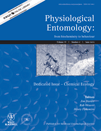
PHYSIOLOGICAL ENTOMOLOGY
Decoding the Dynamics of Insect BehaviorPHYSIOLOGICAL ENTOMOLOGY is a prestigious journal published by WILEY, focusing on the intricate relationships between physiological processes and the ecological and evolutionary dynamics of insects. With an ISSN of 0307-6962 and E-ISSN of 1365-3032, this journal has been at the forefront of insect science since its inception in 1976, contributing significantly to the understanding of insect physiology and behavior. The journal has established itself within the academic community, currently holding a position in the Q2 quartile for both Ecology, Evolution, Behavior and Systematics and Insect Science, highlighting its relevance and impact in these fields. Although there are no Open Access options available, researchers and practitioners can rely on its regular publications to stay abreast of pivotal discoveries and methodologies in insect physiology. With a commitment to advancing the field through rigorous peer-reviewed research, PHYSIOLOGICAL ENTOMOLOGY serves as an essential resource for researchers, professionals, and students alike.

CANADIAN JOURNAL OF ZOOLOGY
Exploring the Wonders of Zoology and BeyondWelcome to the Canadian Journal of Zoology, a leading academic journal in the fields of Animal Science and Zoology as well as Ecology, Evolution, Behavior and Systematics. Published by Canadian Science Publishing since 1965, this esteemed journal serves as a vital platform for researchers, professionals, and students to disseminate and engage with significant findings in zoological and ecological research. With an impact factor placing it in the Q2 category and rankings reflecting its influence (201/490 in Animal Science and Zoology; 372/721 in Ecology), the journal is committed to advancing the understanding of animal biology and environmental interactions. Although currently not an open access publication, it provides comprehensive resources and studies that are crucial for the academic community. Based in Ottawa, Canada, the journal continues to push the boundary of knowledge right up to 2024 and beyond, making it an essential resource for anyone dedicated to the life sciences.
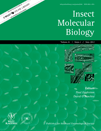
INSECT MOLECULAR BIOLOGY
Unraveling the Molecular Mysteries of InsectsInsect Molecular Biology, published by Wiley, is a leading journal dedicated to advancing the field of insect biology through molecular perspectives. With a prominent ISSN of 0962-1075 and an E-ISSN of 1365-2583, this journal has gained a significant reputation since its inception in 1992, showcasing a diverse array of research that spans across genetics, molecular biology, and specific aspects of insect science. As of 2023, it has achieved a remarkable categorization, recognized as Q1 in Insect Science and Q3 in Genetics and Molecular Biology, underscoring its pivotal role in fostering academic discourse at the intersection of biology and technology. The journal is indexed in esteemed databases with strong rankings, sitting at the 82nd percentile in Insect Science, which highlights the impactful research it publishes. While it currently does not offer open access, Insect Molecular Biology remains an essential resource for researchers, students, and professionals eager to explore the complexities of insect life at the molecular level. By disseminating innovative findings and methodologies, the journal significantly contributes to both theoretical and applied entomological research, making it a cornerstone for anyone passionate about the intricate world of insects.

PFLUGERS ARCHIV-EUROPEAN JOURNAL OF PHYSIOLOGY
Advancing the Frontiers of Physiological SciencePflügers Archiv - European Journal of Physiology, published by Springer Heidelberg, stands at the forefront of physiological research, showcasing groundbreaking studies since its inception in the 1950s. With a distinguished ISSN of 0031-6768 and an E-ISSN of 1432-2013, this esteemed journal maintains a robust reputation, holding Q1 rankings in Clinical Biochemistry, Physiology, and Medical Physiology as of 2023. Its impressive Scopus rankings place it in the top percentile across various categories, including Biochemistry, Genetics and Molecular Biology and Medicine. Pflügers Archiv serves as a vital platform for researchers, professionals, and students, facilitating the dissemination and discussion of advanced physiological concepts and methodologies. Although it does not currently offer open access, its rigorous peer-review process ensures the highest quality publications that contribute significantly to our understanding of physiological science. Explore the depth of physiological research that shapes our academic landscape today.
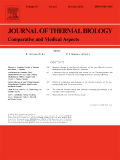
JOURNAL OF THERMAL BIOLOGY
Advancing Knowledge at the Intersection of Heat and LifeJOURNAL OF THERMAL BIOLOGY, published by PERGAMON-ELSEVIER SCIENCE LTD, is a leading international journal dedicated to the interdisciplinary study of thermal biology, exploring the impact of temperature on biological systems. Established in 1975 and continuing its vital contributions through 2024, the journal has consistently ranked in the upper quartiles of its categories, notably achieving Q1 in Agricultural and Biological Sciences, Q2 in Biochemistry, and Q3 in both Developmental Biology and Physiology as of 2023. With an impressive Scopus ranking reflecting its influence and reach within key biological sciences fields, this journal serves as an essential platform for researchers, professionals, and students interested in thermal impacts on biological processes. While the journal does not offer open access, it remains a pivotal resource through its robust peer-reviewed content, fostering academic discourse and advancing knowledge at the intersection of thermal dynamics and biological research.

Journal of Experimental Zoology Part A-Ecological and Integrative Physiology
Innovating research at the intersection of ecology and physiology.The Journal of Experimental Zoology Part A - Ecological and Integrative Physiology, published by WILEY, is a distinguished peer-reviewed journal focusing on ecological and evolutionary physiology, providing a robust platform for research that bridges both ecological and integrative physiological concepts. With an impressive impact factor and recognition as a Q1 journal in both Animal Science and Zoology and Ecology, Evolution, Behavior and Systematics in 2023, it positions itself as a leader in advancing our understanding of organismal biology and environmental interactions. The journal is committed to open access, offering researchers and professionals worldwide the opportunity to share and disseminate their findings freely. Since its inception in 2017, it has rapidly gained prominence—ranking within the top percentiles of Scopus Ranks across several disciplines, including genetics and molecular biology. This not only underscores its relevance but also highlights its vital role in facilitating interdisciplinary approaches essential for addressing contemporary biological challenges. Researchers, educators, and students alike will find in this journal a valuable resource for cutting-edge studies and innovative methodologies in the field.